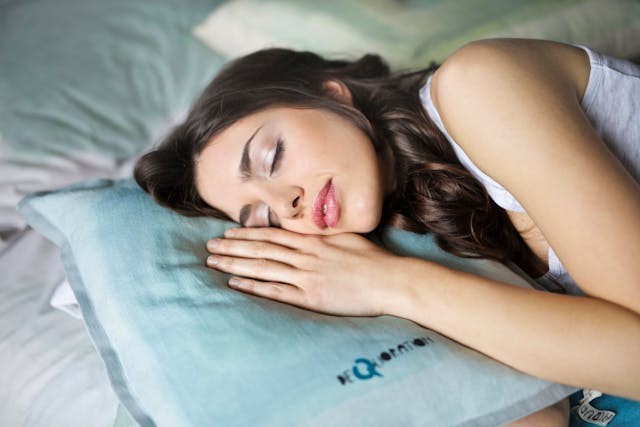
(Photo : Pexels/Andrea Piacquadio)
Sleeping at least seven hours each night is important to keep your youthful glow, according to a report. Otherwise, you will not reap benefits from what's supposed to be a beauty rest.
What Happens When You Sleep Less Than 7 Hours a Night?
Not having enough sleep will not only affect your mood and disposition but also influence your appearance, particularly your face.
Horrifying photos show what might happen to your face if you don't get 7 hours of sleep every night, including dark circles, more wrinkles, and sagging skin.
Simba did a survey involving 2,000 Britons. The poll asked about their sleep habits and facial appearance. They used artificial intelligence (AI) to come up with the photos.
The findings showed that over half of Britons, especially those over 55, do not sleep at least seven hours per night. Female respondents reported feeling anxious and exhausted in addition to noticing small lines, drooping skin, and mild creases.
On the other hand, male responders who did not get enough sleep reported having dry skin, bags under their eyes, and a tired appearance.
Age seems to be a significant factor in these impacts.
While only 12% of those who were sleep-deprived reported having dry skin overall, among those aged 18 to 24, this number shot up to 20%.
Furthermore, compared to the average of 20% in this age group, nearly a third of them had eye bags following a restless night.
Dark circles were discovered to be the primary adverse consequence of sleep loss in older subjects.
The researchers used AI to conjured up images of men and women of various ages who had chronically inadequate sleep based on these data.
"Not getting enough sleep, especially over a long stretch of time, can harm both your mind and body, and even affect your skin, whatever your age," said Lisa Artis, Deputy CEO of Simba's charity partner, The Sleep Charity. "While genetics play a role in affecting our appearance as we get older, skimping regularly on sleep can make the situation even worse."
Dark circles, extra wrinkles and sagging skin: Terrifying images reveal what can happen to your face if you don't get 7 hours of sleep a night https://t.co/IOIA9ACf3q pic.twitter.com/PV1Ba9quci
— Daily Mail Online (@MailOnline) April 15, 2024
ALSO READ: Time-Monitoring Behavior While Trying To Sleep Could Worsen Insomnia [Study]
Lack of Sleep Can Lead To Several Health Problems
Dr. Pravin Naphade, an Indian neurologist from Pune, India, cautioned against young ladies getting too little sleep. Sleep is crucial for promoting long-term welfare, but it is sadly undervalued as life seems to be moving more quickly these days.
He continued by saying that bad sleep might be caused by stress, an unhealthful diet, or spending too much time on screens, all of which seem to be getting worse in the modern world. Naphade noted that young women are not immune to the negative consequences of sleep deprivation, which have been connected to a wide range of health problems.
Dr. Naphade lists infertility as one of the "most concerning consequences" of insufficient sleep. Random sleep patterns have been linked to hormone imbalances and infertility, according to studies.
Though it may not be immediately obvious how infertility could cause bad sleep, the hormone imbalance that causes infertility may also be a factor in sleep problems.
Other unfavorable effects included cardiac problems in general, depression, and Alzheimer's disease. These conditions are all connected to lack of sleep. The physician cautioned that lack of sleep might also impair daily functioning and jeopardize brain health.
RELATED ARTICLE: How Do 7 to 9 Hours of Sleep Help Improve Mental Health?
Check out more news and information on Sleep in Science Times.














